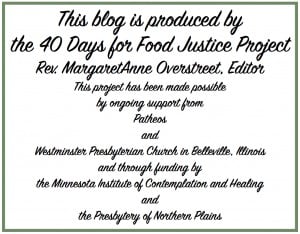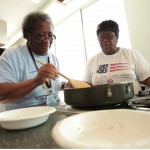Though our attempts to find a working definition of food justice have only scratched the surface of the larger conversation, after seven days of food justice posts, we are beginning to see that the issues included in the food justice conversation are numerous and diverse.
In an article several years ago in the New York Times, author Michael Pollan wrote about the dificulty in navigating “an increasingly complex, politicized and ethically challenging food landscape.”
Wouldn’t it be nice if we could find a single “right” answer that would bring justice to every facet of the food justice conversation?
Pollan goes on to say: “I’ve been doing a lot of food reporting over the past couple years and have discovered there are no simple, one-size-fits-all answers to these questions. But it seems to me the crucial thing is that such questions about how we should eat, and how what we eat affects both our health and the health of the world, confront us today in a way they never before have.”
In other words, there is no easy answer … and the stakes have never been higher.
A number of years ago, I attended a large regional meeting of pastors and other church leaders in my denomination. The lunch buffet was in the “potluck” style: ham or barbeque paired with more side dishes, salads and desserts than you could count.
I moved efficiently down one side of the long table, filling my plate and talking to those in line on either side of the buffet tables. The line on the opposite side of the tables seemed to be stopped, and I quickly discovered the cause: a blind woman was being assisted through the line by her pastor, who was explaining each of the food choices to her and helping her fill her plate with the offerings that she wanted.
“Here is a broccoli and cauliflower salad. It’s the kind with the vinegar-based dressing on it that we sometimes have at our potlucks at church. Would you like some of that?” he was saying.
“Is it the kind with the red onions and sunflower seeds? I probably should stay away from onions at a meeting like this.”
And so the conversation went, as I watched, amazed. Never in my life had I been as attentive to my meals as they were to her potluck plate. Watching the woman and her pastor at the potluck buffet, I realized that I wanted to eat consciously rather than unconsciously, intentionally rather than accidentally.
The experience helped to wake me from a long food coma. As I continued to reflect on the encounter, I began to suspect that perhaps the key to an improved global food system was not greater food morality, but greater food awareness.
So, when I teach workshops on the subject of food justice, I do not attempt to suggest that any one way of eating could answer every ethical challenge. I do suggest, however, that one thing that each of us can do on behalf of food justice is to be more mindful about what we are eating so that we might cultivate a greater sense of food awareness.
Eating more mindfully?
There are plenty of ways to do it. For you, it might mean reading the labels more carefully when you shop for food. For someone else it might be a commitment not to eat in the car or in front of the television. Another way might be to pay more attention to the number of miles your food traveled in order to reach your plate, or to keep track of how much food your family wastes in a week, or to eat more slowly in order to savor the meal.
Even participating in the 40 Days for Food Justice project cultivates greater food awareness by allowing us to learn more about the issues of food justice.
Over the next few days, I invite you to eat more mindfully.
It’s not an easy answer.
But it’s a good place to begin.
———————————-
Lenten Calendar for FEBRUARY 25
Read Mark 14: 17-26. Tonight at your evening meal, set an extra place. Imagine that Jesus is eating dinner with you.
————————————
Sign up to receive the daily meditations by email, or like us on Facebook.
We need your stories!
We’re already looking ahead to the 40 Days for Food Justice Project for 2016 and we’re looking for more stories, experiences, prayers and resources about food justice and food injustice.
If you would like to contribute – or would like to recommend a contributor – please send us an email and let us know.
About:
In addition to being the founder and editor-in-chief of the “40 Days for Food Justice Project”, the Rev. MargaretAnne Overstreet is a mom, a Presbyterian pastor, and a certified Health Coach. She does ministry with and among the good people of Westminster Presbyterian Church in Belleville, Illinois, where she gets her hands dirty in the community garden and, every Sunday, preaches with bare feet. She treasures family time, relishes every opportunity to teach and write about food justice, and loves to play outside with her dogs. Find out more about her at www.AnInBetweenPlace.com












